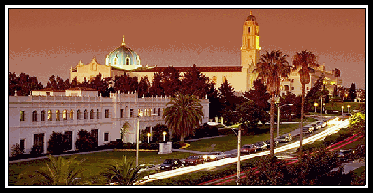Syllabus
| Mission Statement | Description | Objectives | Grading | Academic Integrity | Text |
School of Business Administration Mission
Statement:
"The USD School of Business mission is to develop
responsible business leaders -- socially, environmentally, and
professionally -- with a global mindset through academically
rigorous, relevant, and values-based education and research.”
This course provides managers with an overview of the
economic environment within which business must operate, and an
understanding of some of the analytical tools that economists
use to solve business and economic problems. The focus is to
enable students to identify, understand and evaluate the
domestic and global forces causing economic change. Key concepts
and ideas from both microeconomics and macroeconomics are
introduced. Topics relevant to real-world issues and problems
provide the focus for in-class discussion. Upon completion,
students are expected to be familiar with the fundamental
concepts of economics, and to be able to analyze how changes in
the economic environment affect business performance and future
strategic options. Prerequisites: GSBA 502 and 510.
At the completion of this course, students will be able to:
-
perform supply and demand analysis to analyze the impact of
economic events on markets,
- utilize microeconomic concepts
in making management decisions,
- analyze the factors that affect the competitive
environment of firms and industries,
- compute different measures of macroeconomic activity, and
evaluate the
shortcomings of traditional economic measures,
- determine the forces that affect the
aggregate level of economic activity and the business
cycle,
- recognize how monetary and fiscal policy can be used to
achieve policy goals, and
- identify the social consequences of national and
international economic activity.
Grades in this class will be based on
examinations (60%) and out-of-class assignments (40%):
- There will be one midterm exam (worth 30% of your grade)
and a final exam (worth 25%). Each exam
will have problem, short answer, and essay
questions. You may use your notes and book during each
exam. Make-up exams will be
given only if you have a written excuse.
- Assignments include the following:
- Homework assignments (20%)
- Team analysis of an industry
(20%)
Ethical behavior is expected at all times.
From the Graduate Bulletin: "Academic
dishonesty is an affront to the integrity of
scholarship at USD an a threat to the quality of
learning. . . Violations of academic integrity
include: a) unauthorized assistance on an
examination; b) falsification or invention of
data; c) unauthorized collaboration on an
academic exercise; d) plagiarism; e)
misappropriation of research materials; f) any
unauthorized access to an instructor's files or
computer account; or g) any other serious
violation of academic integrity as established by
the instructor. An act of dishonesty can lead to
penalties in a course such as reduction of grade;
withdrawal from the course; a requirement that
all or part of a course be retaken; and a
requirement that additional work be undertaken in
connection with the course."
Paul G. Farnham. Economics for Managers,
3rd Edition, Prentice Hall, 2014
|


